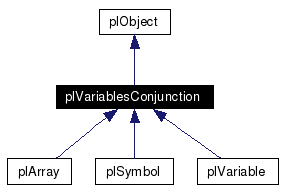
#include <plVariablesConjunction.h>
Inheritance diagram for plVariablesConjunction:


Public Member Functions | |
| plVariablesConjunction () | |
| Default constructor, creates an empty variable. | |
| virtual | ~plVariablesConjunction () |
| Destructor, if the variable represents a list erase the list but not the variables on the list. | |
| string | name () const |
| Gets the variable name, given by the user. | |
| double | cardinality () const |
| Returns the number of values taken by the variable conjunction. | |
| bool | isDiscretized () const |
| Returns true if the plVariablesConjunction is discretized, false otherwise. | |
| unsigned int | dim () const |
| Returns the number of plSymbols that compose the plVariablesConjunction. | |
Protected Member Functions | |
| virtual void | Output (ostream &out) const |
| Writes the variable at the output given by "out". | |
| plVariablesConjunction (const list< kplVariable * > &kernel_variable_list) | |
| Constructor using a list of kplVariables. | |
Protected Attributes | |
| unsigned int | Dsize |
| Size of the variable list (variable_list), faster that the acces to size() function. | |
| list< kplVariable * > | variable_list |
| List of the function arguments variables. | |
Friends | |
| class | plData |
| class | plArray |
| class | plBellShape |
| class | plCndBellShape |
| class | plCndKernel |
| class | plCndNormal |
| class | plCndProbTable |
| class | plCndUnknown |
| class | plComputableObject |
| class | plDirac |
| class | plFunctionalDirac |
| class | plGamma |
| class | plJointDistribution |
| class | plKalmanFilter |
| class | plKernel |
| class | plKernelMap |
| class | plNormal |
| class | plPoisson |
| class | plProbTable |
| class | plSymbol |
| class | plUniform |
| class | plUnknown |
| class | plValues |
| class | plVariable |
| class | plKernelTable |
| class | plLogNormal |
Definition at line 38 of file plVariablesConjunction.h.
|
|
Destructor, if the variable represents a list erase the list but not the variables on the list. If empty variable, erase the empty variable |
|
|
Returns the number of values taken by the variable conjunction. For example, if a variable 'x' takes 10 possible values and another variable 'y' takes 3 possible values, then the conjunction x^y takes 30 (10 x 3) possible values. It returns zero if the variable is not discretized e.g. plRealType non-discretized Referenced by isDiscretized(). |
 1.4.1
1.4.1